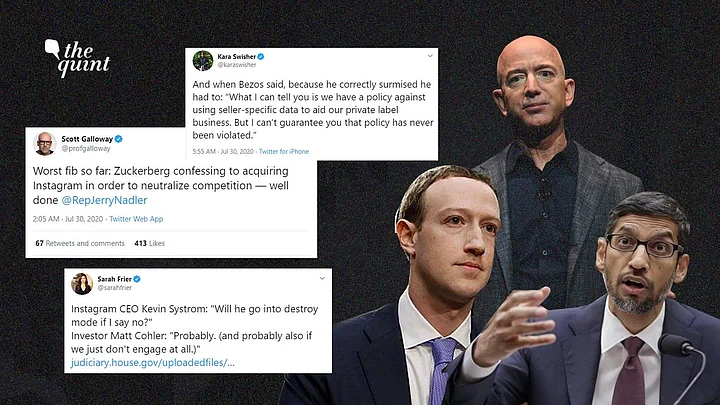The tech antitrust hearing in front of the US Congress on 29 July saw leaders of the top tech companies of the world – Apple, Google, Facebook and Amazon – grilled by the 15-member House Judiciary Committee in a five-hour long hearing.
The hearing witnessed many accusations against these companies of misusing their monopolistic power to bully rivals, kill competition, among others.
Even US President Donald Trump expressed concerns and demanded a crackdown on the 'Big Tech' companies.
What came out of this hearing has been a series of controversial responses by some of the CEOs, who were forced to divulge information about adopting unfair business strategies to grow their own business.
Many global technology experts and commentators have reacted to these testimonies, with most dissatisfied by the way that these CEOs could weave their way out of a sticky situation.
‘Instagram Can Hurt Us’
Perhaps the headline maker of the event was when Rep Jerry Nadler asked Facebook CEO Mark Zuckerberg about emails he had sent in 2012, describing Instagram as a "threat" and "disruptive".
The Verge’s Casey Newton got hold of the email interaction between Zuckerberg and his then chief financial officer, David Ebersman, on “neutralising the competitor (Instagram).”
Author and entrepreneur Scott Galloway called Zuckerberg’s confession on acquiring Instagram in order to neutralise competition as the “worst fib so far.”
Sarah Frier, who is a reporter at Bloomberg, also uncovered email conversations between then Instagram CEO Kevin Systrom and investor Matt Cohler on how Facebook could have gone into “destroyer mode” if Instagram says no to the deal.
Rep Pramila Jayapal also questioned Zuckerberg on Facebook’s billion-dollar acquisition of Instagram and how it copied competitors’ app features.
She specifically referenced email interactions between Zuckerberg and company COO Sheryl Sandberg, where Facebook was asked to be “even more aggressive” in copying competitors.
Zuckerberg was forced to admit the obvious. He said that the company “certainly adapted features that others have led in.”
Just recently, TikTok CEO Kevin Mayer slammed Facebook for copying its platform to make Instagram Reels, which is also a short video making feature.
'Can’t Guarantee That Company Policy Hasn’t Been Violated': Jeff Bezos
Amazon CEO Jeff Bezos admitted to having a company policy against using seller-specific data to aid its business but added that he is not aware whether this policy has been violated before.
“We have a policy against using seller-specific data to aid our private label business, but I can’t guarantee you that policy has never been violated.”Jeff Bezos, Amazon CEO to an Antitrust Committee member.
William Oremus, who is a Senior Writer at tech website OneZero, says he can’t believe that Bezos could not recall the time when Amazon threatened to drive one of its competitors (Diapers.com) out of business and ultimately ended up “buying their company.”
Amazon was also accused of selling a copycat version of a competitor’s product at a lower cost on its platform to drive it out of the competition.
Annie Gaus, who covers technology at online news portal The Street, tweeted how Amazon considers some of the smaller sellers on its platform as "internal competitors."
Rep Jayapal also called out Amazon for accessing data of third-party sellers to gain an advantage.
Perhaps the most emotional moment of the hearing was when Rep Lucy McBath played an audio clip of a bookseller on Amazon (possibly of Indian-origin) who claimed she was delisted from Amazon’s website and was unable to get any response from the company.
Bezos told the representatives that his company would be happy to look into the matter.
Google’s Chinese Connection?
Google CEO Sundar Pichai got the most heat at the hearing, where his company faced bipartisan criticism. Pichai was criticised for Google’s dominance in the digital ad business, its privacy practices and policies towards working with the military.
There was a point when Rep Matt Gaetz grilled Pichai over allegations of advancing China’s AI, helping better the targeting system of the Chinese J-20 fighter jet and at the same time refusing to work with the US Military.
Pichai denied any such claims and said the decision to back out from the US military contract was taken after inputs from employees.
He also admitted not recalling the Chinese stealing US company data which was shocking for the representative.
Amir Efrati, who wrote for the Wall Street Journal, was quick to tweet out the Wikipedia page of the attack.
There was also a light moment was Pichai was trying to convince representatives of why their campaign emails were going directly to Gmail’s spam folder. Um, where else would spam go?
(At The Quint, we question everything. Play an active role in shaping our journalism by becoming a member today.)
